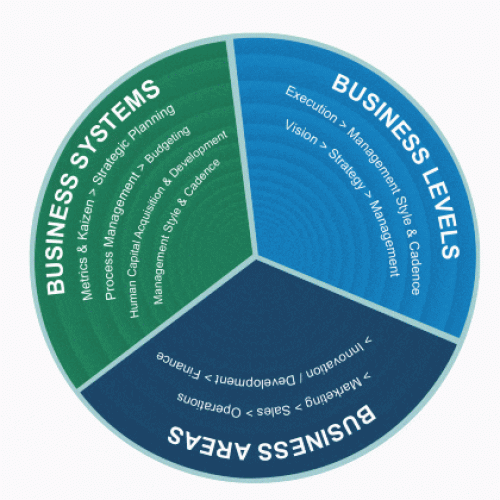Most entrepreneurial failures come to a lack of preparation and the “They don’t know what they don’t know” issues. Especially common in younger people raised on the crazy “Everyone gets a trophy” mentality. The stupidest idea in history is teaching kids they do not have to try and should still expect success and compliments. Insanely teaching socialism, which we know always fails when total productivity declines.
Every successful entrepreneur agrees “grit,” or persistence, is a necessary personality attribute for success. This means our education system is actually teaching the opposite. “Do not try and learn from your mistakes” is a death sentence for entrepreneurs. Persistence and effort always win the day.
I forget who said it, but 90% of success is preparation. I refer to preparation that started 10 years earlier in building your own skills. A complete management team needs about forty skills to grow and then scale (25%+ CAGR) a company. Only these teams and companies will attract capital and top people like magnets.
I believe Woody Allen said “90% of life is showing up,” and that is true, as long as you spent the first 5, 10, or even 20 years of your career working on developing yourself first. As he did before he said it. He forgot to mention that, though.
Key personality factors that make the best entrepreneurs are:
- Curiosity and a desire and ability to constantly learn. This will always be true, especially with accelerating change.
- Willingness to accept risk. This is one reason there are more male entrepreneurs than female. Women are wired more for safety. Ten million years of evolution are working there.
- High intellect and critical thinking skills to make data-driven decisions. Another area where our education system is failing. And what colleges and universities are supposed to excel at.
- Being willing to work hard and long hours to do what it takes. I never met a successful, lazy entrepreneur. They control their time and focus on high-value activities.
- Having a clear long-term vision but also the ability to set annual goals that must be achieved to stay alive and continue to prepare for that future with steps that create cash flow. This usually means a stepwise view of incremental (product roadmap) to the future vision. So, your market entry strategy is rarely the same as the long-term vision. This must be developed, and I find most new entrepreneurs lack the ability to see 5 years out, plan, and develop a long-term strategy. They are usually focused on the “now.”. They must have a complete vision of where the company will be 5+ years out.

- Resiliency. Or “grit,” as mentioned above. Most people, including friends and family and prospects alike, will tell you that you are crazy when the idea is sufficiently ahead of the market and world view (disruptive). Henry Ford said, “If I asked what they wanted, they would have said a faster horse.”. And Einstein said, “If at first an idea is not absurd, it has no hope.”. Richard Branson and Steve Jobs do little or no market research because they do not believe the prospect’s view of the future. This is 100% true with a disruptive product or company. But not true for incremental improvements. The deep thinking here is that if it were obvious people would have done it a long time ago, you need to dig deep, not reject ideas initially. Brainstorming them will create many permutations and progress. By definition, the future vision does not agree with the present state of affairs in what you are trying to change.
- Creativity. This is hard to define and measure, but there are ways to enhance your creativity. Imagination and having a vision of the future require this. I took a personal development program on creativity in the late twenties and felt it had a real impact. Playing music, having hobbies, travel, medication, reading, collaboration, and many other things enhance creativity.
- Flexibility in thinking. Entrepreneurs need to evolve and change as a company grows through the five main stages of development. What it takes to scale a company is also greatly underestimated.
- A willingness to both listen and override your own feelings when you have someone with more expertise in an area. Scaling a company beyond 5-7 people requires skills not taught anywhere, even the best Ivy League MBA programs. With about forty strategic-level skills needed on a team, no one person has them all. Some require different personality types. I have courses on personality types, testing, and my three favorite psychological tests that can enhance hiring success at www.EntrepreneurshipU.com.
- Structured thinking and systemization: There are at least 30 processes and four shifts in management style (reorganization of org chart required) for the typical company before reaching just 50-100 employees and around $10M in sales. There is a reason only 1 in 400 companies ever reaches $10M and 1 in 6,330 reaches $100M. Few founders and owners can change their management style, mindset, and habits after being successful in “startup mode” and move into “professional manager” mode. Most need to hire very experienced team members to bring that expertise onto their teams. I have had many clients stuck in this $5M to $10M sales range who are in their own mental prison. Sometimes I can break them out, but not always. Some will never break through it due to mindset issues. And I am not talking about self-confidence or effort here, just the ability to adapt, change, and listen to others more. Many cement their thinking with the logic “I got here so I know best.”. This is often just wrong. “What got you here and worked in a startup or even a $5M company will not get you to $20M or $100M in sales for sure. It is just very different.
In most cases, all of these personality traits are required, not optional. If you cannot see these in yourself, then you are likely far better off working for someone else longer to develop these skills. None are genetic and cannot be learned with time, though some may find it easier.
Seek mentors that have what you are missing on this list several years before you launch your own company and more as it grows. People who already accomplished what you are trying to do, not a “Certified Coach.”. You can likely double or triple your chances of success with this mindset of advanced preparation and self-awareness. Of course, you can also seek these personality attributes and skills in co-founders.
I have read many successful entrepreneur’s biographies, psychological studies, and articles, and I would say none really conflict with these foundational principles. And they are timeless, too.
May all your ventures be successful.
Free Webinar Replay: Top 10 Challenges of Scaling a Business

Click here to see the replay for free.
What can we help you with today? Scaling, training, consulting, coaching?
Call (619) SCALE06 or (619) 722-5306 9am-6pm CT
Or CEOs can schedule a free 30-minute strategy session by clicking here.











